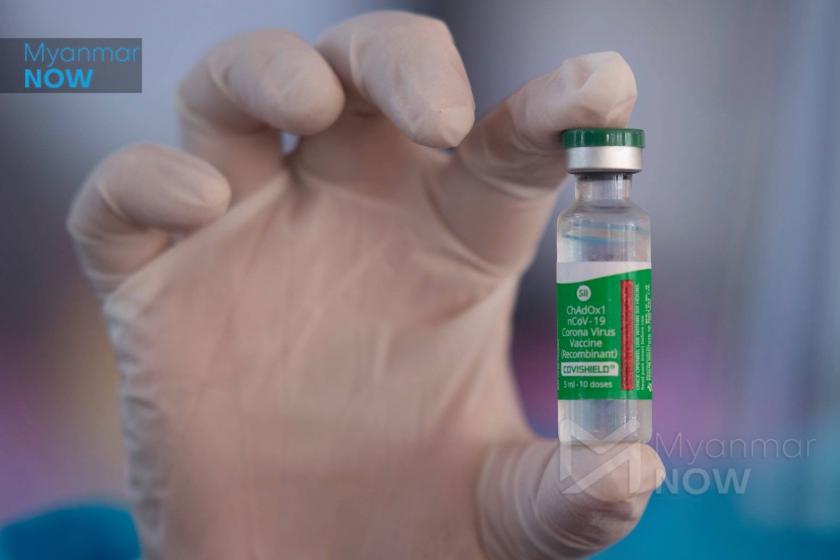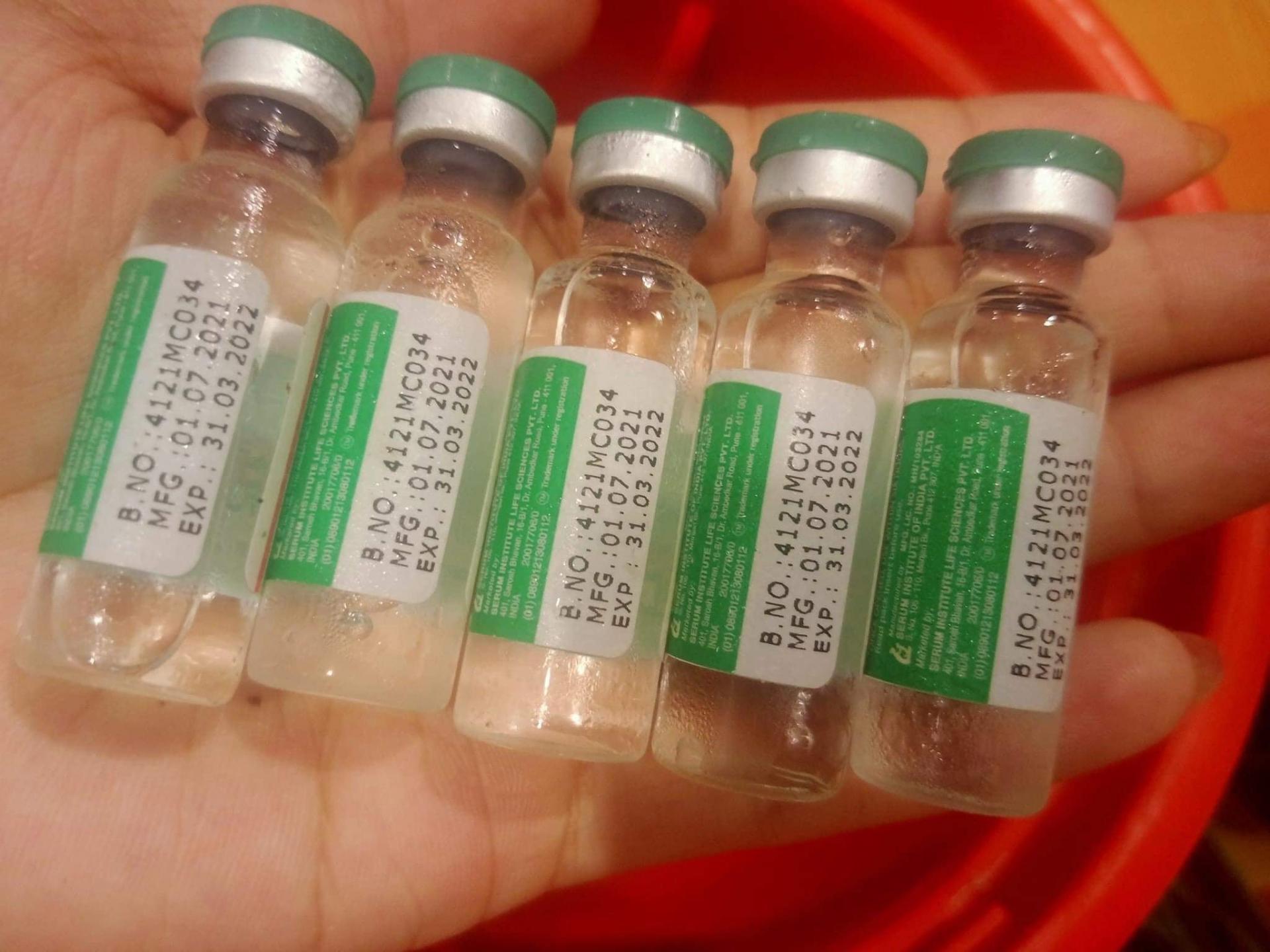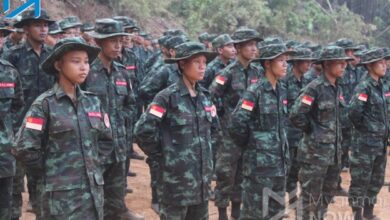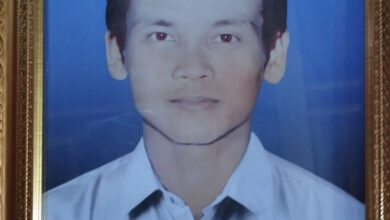
Myanmar black market retailers are selling the Indian-manufactured Covishield vaccine online at a mark-up of up to 25 times the original price as the public desperately attempts to protect themselves and their families from the Covid-19 crisis that has unfolded since the coup.
One vial of the vaccine, produced by the Serum Institute of India, is typically priced at 80,000 kyat (US$49), but locally it has been selling for as high as 2 million kyat ($1,215), Myanmar Now has learned.
While the total number of Covishield sales within the country could not be determined due to the nature of the transactions, local brokers confirmed that the demand increased after infection and fatality rates rose dramatically during the pandemic’s third wave, which started in July.
Mandalay-based retailer Aung Min Ko told Myanmar Now that many people had refused to take the Chinese Sinovac vaccine which has been provided in limited quantities by the military council. Those who can afford it have instead been paying for Covishield, which the National League for Democracy government had reportedly been planning to procure for the public before they were ousted in the February 1 military coup.
“People are willing to pay as much as 400,000 kyat ($243) per shot. The market demand is unbelievably high,” Aung Min Ko said of the two-jab regiment, recommended by the manufacturer to be spaced 12 to 16 weeks apart.
In addition to the vaccine, he noted that he was also selling the drugs Remdesivir, an antiviral, and RoActemra, an anti-inflammatory typically used to treat rheumatoid arthritis. Both have been used experimentally in the treatment of Covid-19 elsewhere.
Remdesivir is being sold online at prices ranging from 85,000 to 400,000 kyat ($52 to $243) and RoActemra is also being marketed as a “life-saving medicine” at prices as high as 6.5m kyat ($3,948), according to the sources who spoke with Myanmar Now.
Other local retailers have also been selling the Chinese vaccine Sinopharm, as well as Enoxaparin, a blood thinner, on Facebook since August.
People are willing to pay as much as 400,000 kyat ($243) per shot. The market demand is unbelievably high – a retailer
The retailers said that people were paying anywhere from 1.3m to 2m kyat ($790 to $1,215) per vial of Covishield, each of which contains 10 doses of the vaccine. Some sellers were even charging the buyers 100,000 to 500,000 kyat ($61 to $304) to administer the jabs to them.
Since early August, as many as 1,000 vials have been imported per day along the Kalay-Tamu route through Chin State and Sagaing Region on Myanmar’s border with India, according to local sources. Those with military ties had also reportedly been illegally importing the vaccines by air.

Vaccines for sale on social media
In a 90,000-member Myanmar Facebook group dedicated to the buying and selling of second hand items, a user named Htoo Thiri Khit posted on August 11 that those who wanted to obtain a Covishield vaccine could sign up through her.
She wrote they would be importing the vaccine by air so that the cold chain required to preserve the contents would not be disrupted, and that certified doctors would administer the shots at The Maze Club, a nightclub in Yangon’s Tamwe Township.
The cost of two doses was 260,000 kyat ($158), she wrote.
She told Myanmar Now that around 600 people had registered with her, and confirmed that she was importing the vaccine through connections with a military hospital.
“Because I am from the military network, I know some doctors and professors from the Defence Services Academy that can buy the vaccines for me as they have gone to India to study,” Htoo Thiri Khit said.
Around 20 minutes after speaking on the record to Myanmar Now’s reporter, Htoo Thiri Khit threatened to sue the publication for going public with the information.
Another Yangon-based broker selling the vaccine in-country said that the price of Covishield was determined by the retailers across the border, and that there was no way to stabilise it.
“Some days, they’re selling it in India at 1.5m kyat ($913) and then the brokers here sell it onwards at 2m kyat. The price is all in their hands,” she said.
She assured Myanmar Now that the vaccines were transported in specialised vehicles at the necessary temperature required to preserve them, and that she had ordered more than 20 vials to share between 100 people.
Both she and Aung Min Ko noted that the Covishield vials imported unofficially from India had labels reading “Not for Sale” and “Use in India Only.” This, they said, was evidence that they were authentic.
Aung Min Ko admitted that they could not guarantee that the cold chain had not been broken during the transportation process.
“There were some occasions where the carriers only stored the vials in coolers when they delivered them. The sellers would, of course, say that they were in the exact condition that they were when the factories produced them. There’s no way for us to know for sure,” he said.
Dr. Aung Than Toe, a Yangon-based doctor, told Myanmar Now that the Covishield vaccines must be consistently stored at 6-8 degrees Celsius, and that they were no longer viable if the storage temperature surpassed 10 degrees. In some cases, he noted, the retailers were storing the vials in household refrigerators.
A hospital superintendent on strike in accordance with the anti-coup Civil Disobedience Movement said that if the vaccines were not stored properly, they may not only be ineffective—they could potentially cause an adverse reaction in patients.
“If you take a vaccine that’s not stored in the cold chain, it may not only not protect you but also harm you in the process,” the superintendent said on the condition of anonymity.
It’s quite easy to understand that illegally imported vaccines could be harmful for you. The police need to take care of that- FDA official
Dr. Khin Zaw, the current director of Myanmar’s food and drug administration, said that the junta health department had already announced that they would be taking action against the illegal imports of the vaccine.
“It’s quite easy to understand that illegally imported vaccines could be harmful for you. The police need to take care of that,” said Dr. Khin Zaw.
Although some 10 pharmaceutical companies have requested permission to import Covid-19 vaccines into the country, only one company—the SML Business Group—was given the green light to do so, according to Dr. Khin Zaw.
Despite the public health crisis sweeping the country, the coup regime’s commander-in-chief Min Aung Hlaing said in an August 9 military council meeting for the prevention, control and treatment of Covid-19 that the country would become impoverished if they were to import the vaccines for its entire population.
He insisted on exploring a “new therapy of traditional medicine through modern technology” to respond to the pandemic, and invited traditional medicine practitioners to take part in such an initiative.
“In the future, we must, without fail, produce medicines to prevent and treat [Covid-19] at home,” he said at the meeting. “If we always rely on the import of medicines from abroad for a population of more than 50 million, the country will be poor.”
![Resistance fighters holding heavy weapons ammunition in central Myanmar. (Photo: Freedom Revolution Force [FRF])](https://myanmar-now.org/en/wp-content/uploads/sites/5/2024/04/438869056_443267851680128_1706386881626943924_n-390x220.jpeg)


